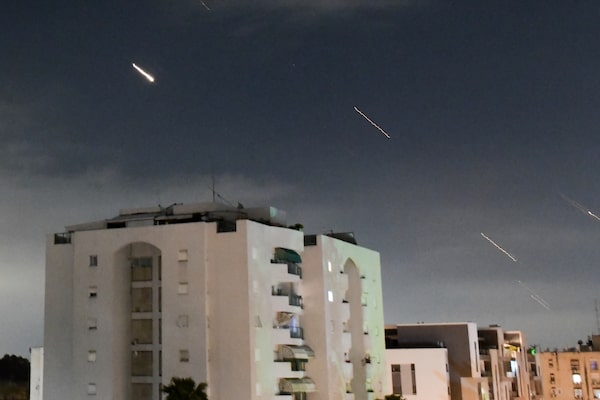
In this April 14, 2024, file photo, Israel's Iron Dome air defense system launches to intercept missiles fired from Iran.Tomer Neuberg/The Associated Press
Iran’s Sunday attack on Israel was so extensive and so sophisticated that it can only be seen as an opening salvo in a military action, says a former head of Israel’s air defence forces, which played a key role in countering the more than 300 drones and missiles Iran launched.
“Iran declared a war – a direct war against Israel,” said Brigadier-General Zvika Haimovich, who led the air defence forces between 2015 and 2018, a period in which two of the country’s most sophisticated air defence systems, David’s Sling and Arrow 3, became operational.
The attack, which Iran said it launched in retaliation for a deadly Israeli air strike on an Iranian diplomatic complex in Syria, did virtually no damage to Israel. An intense diplomatic effort is under way to dissuade Israeli leaders from pursuing a counterattack that could provoke conflict with Iran and the heavily armed proxies it has placed around the region, including in Lebanon, Syria, Iraq and Yemen.
But Mr. Haimovich, who is now retired, said he believes there is “zero” chance that Israel will not respond to this “very aggressive action.”
For Israel, he told reporters Wednesday, the question is how it can do so while keeping together the coalition that helped to shoot down nearly all of the Iranian attack.
That coalition, which included the U.S., Britain, France and Jordan, forms part of a regional defence arrangement that Israel has worked to build.
The question for Israeli leaders is whether the defensive coalition will also be an offensive coalition, Mr. Haimovich said.
Iran’s basic aviation capabilities are limited, he added. Its air force, he said, is in “very poor condition,” while most of its air defence systems are “very, very old.”
But, he said, Iran’s attack on Sunday showed its true strength lies elsewhere. “Iran is a superpower in tactical ballistic missiles and UAVs,” he said, using an abbreviation for unmanned aerial vehicles.
The attack involved launches from Iraq, Yemen and Iran, including a barrage of slow-moving drones, much faster cruise missiles and even faster-moving ballistic missiles, all synchronized to hit Israel around 2 a.m.
Part of the attack employed Emad missiles, which have a range of 1,700 kilometres and can carry warheads of more than 700 kilograms.
“If a state tries to bring this huge threat to another state, there is no other meaning,” Mr. Haimovich said. “Not to threaten you. Not to deter you. To attack you and create huge damage.”